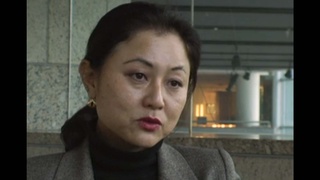Interviews
Father as prisoner of war in hospital
My mother made calls to see if she could visit her husband, and then she started visiting him each day. And since he was getting weaker and weaker, she asked the authorities if he could be taken to a hospital, and when he feels better, put him back into prison. And so, they did. But, the hospital was the only hospital there, San Pedro Hospital—all the injured merchant marines on Wake Island were being sent there, and they were all in one big room, and they were all injured, you know. And my father was in the same room and only around his bed there was a sheet, and it said, Prisoner of War. And so, when my mother went to visit him and saw that, she felt that he would be beaten up by all the, other, the Americans who were there as injured Americans. And so then, she kept begging the hospital to give him a room of his own—that he would never make it out alive in that big room with the Americans.
And then, we kids got to see my father once, it was January 13th. My twin brother came back, he was going to Berkeley, and he immediately, it seems so strange, he immediately got into the Army. And, gee, we thought, gee, that’s strange that here my father, they don't, you know, they think he's a spy and they have him in prison, and my brother they take him into the U.S. Army. Well, he was so proud when he got his uniform, that the day we visited my father was January 13th. When my father saw my brother in a uniform, he starts shaking. He thought it was someone else coming again to interrogate him. And, my brother said, Oh, I'm your son. You know, and my father never believed it. And so, when we could see how frightened he was, we said, Look, let’s just leave, 'cause pop just looks too scared.
Date: June 16, 2003
Location: California, US
Interviewer: Karen Ishizuka, Akira Boch
Contributed by: Watase Media Arts Center, Japanese American National Museum.
Explore More Videos

Jobs in Manzanar
(b. 1921) Nisei veteran who served in the occupation of Japan

Sugar beet and potato farming in Idaho
(b. 1921) Nisei veteran who served in the occupation of Japan

Recalling Pinedale and Tule Lake concentration camps
Judge, only Japanese American to serve on CWRIC.

Impressions of student relocation in South Dakota
Judge, only Japanese American to serve on CWRIC.

Being called out of Reserves
(b. 1921) Nisei veteran who served in the occupation of Japan

Fort Snelling
(b. 1921) Nisei veteran who served in the occupation of Japan


Attempts to sign up for military service
(1917 - 2004) Political activist

No discrimination in Argentina (Spanish)
(1925-2014) La Plata Hochi, Journalist

Traveling from Manila to Tokyo
(b. 1921) Nisei veteran who served in the occupation of Japan

Camp stories impact on her career
Sansei judge on the Superior Court of Los Angeles County in California

Concentration camp from a Japanese mother’s point of view (Japanese)
Shin-Issei from Gifu. Recently received U.S. citizenship

Fully aware of discrimination in America
(1919 - 2006) World War II and Korean War veteran


People with talent in the 100th infantry battalion
(1919 - 2006) World War II and Korean War veteran
